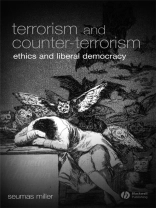Undoubtedly, the events of September 11, 2001 served as a wake-up
call to the scourge of global terrorism facing twenty-first century
societies. But was the attack on the World Trade Center a crime or
an act of war? Is seemingly indiscriminate violence inflicted on
civilians ever morally justified? And should society’s response
always be in kind – with blind, destructive violence? For
that matter, are all civilians truly ‘innocent’? The
answers are not always so simple.
Terrorism and Counter-Terrorism: Ethics and Liberal
Democracy provides sobering analyses of the nature of
terrorism and the moral justification – or lack thereof
– of terrorist actions and counter-terrorism measures in
today’s world. Utilizing a variety of thought-provoking
philosophical arguments, the historic roots of terrorism and its
contemporary incarnations are explored in depth. Detailed analyses
of organizations such as the IRA, the ANC, Hamas and Al-Qaeda will
reveal the many faces of terrorism and its disparate motives and
tactics. Discussion of the nature and scope of terrorism and
whether it can ever be morally justified is balanced with analysis
of counter-terrorism strategies and the methods and moral limits of
counter-terrorism.
Terrorism and Counter-Terrorism will greatly
broaden our understanding of the nature and morality of terrorism
and counter-terrorist pursuits – a crucial precondition for
establishing any form of enduring peace between nations in the
twenty-first century world.
Cuprins
Acknowledgements.
Introduction.
1. The Varieties of Terrorism.
Al-Qaeda.
Terrorism and Counter-Terrorism in the Israeli-Palestinian
Conflict.
Terrorism and Counter-Terrorism and the IRA in Northern
Ireland.
The African National Congress’s Armed Struggle in
Apartheid South Africa.
Terrorism and Counter-Terrorism in India.
Conclusion.
2. Defining Terrorism.
The Definition of Terrorism in Terms of Innocents.
The Definition of Terrorism in Terms of Non-Combatants.
Terrorism, Combatants and Authoritarian States.
The Definition of Terrorism: An Indirect Strategy.
Conclusion.
3. Terrorism and Collective Responsibility.
Moral Justification for the Use of Deadly Force.
Civilian Immunity and Human Rights Violations.
Civilian Immunity and Culpable Omissions.
Terrorism and Non-Violent Rights Violators.
Conclusion.
4. Terrorism-as-Crime.
Terrorism-as-Crime.
Terrorism-as-Crime and Police Institutions.
Counter-Terrorism and Human Rights in Liberal Democracies at
Peace.
Conclusion.
5. Terrorism, War and States of Emergency.
Terrorist Attacks, Disasters and States of Emergency.
Terrorism, Internal Armed Struggles and Theatres of War.
Targeted Killings.
Targeted Killings and the Problem of Dirty Hands.
Conclusion.
6. Torture.
Definition of Torture.
What Is Wrong with Torture?.
The Moral Justification for One-Off Acts of Torture in
Emergencies.
The Moral Justification for Legalized and Institutionalized
Torture.
Conclusion.
7. Bioterrorism and the Dual-Use Dilemma.
The Biological Weapons Convention.
Experiments of Concern.
Dual-Use Research: The Ethical Issues.
Dissemination of Dual-Use Research Results.
The Regulation of Dual-Use Research.
An Independent Authority.
Conclusion.
Bibliography.
Index
Despre autor
Seumas Miller is Professor of Philosophy at Charles Sturt University and the Australian National University (joint position) and Director, Centre for Applied Philosophy and Public Ethics (an Australian Research Council funded Special Research Centre). He has published Police Ethics (2006), Corruption and Anti-Corruption with P. Roberts and E. Spence (2005) and Social Action (2001).












